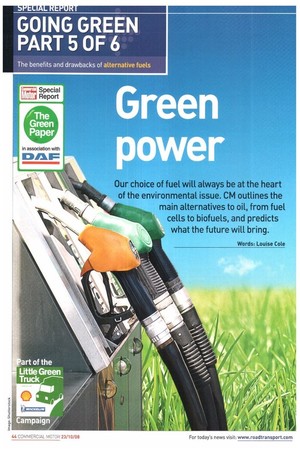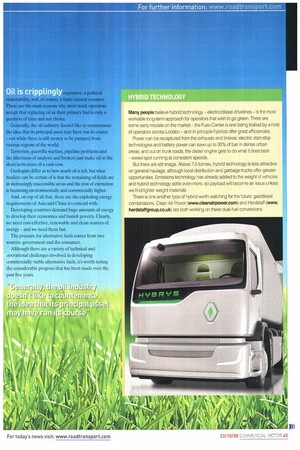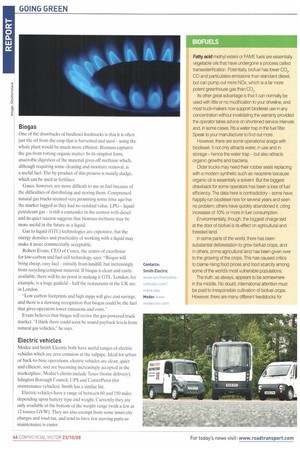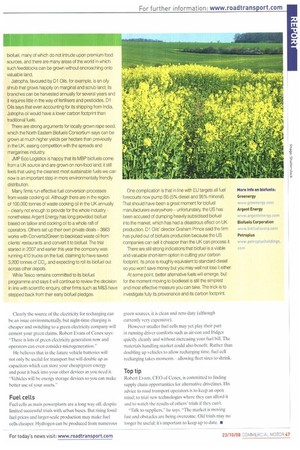Our choice of fuel will always be at the heart
Page 44

Page 45

Page 46

Page 47

If you've noticed an error in this article please click here to report it so we can fix it.
of the environmental issue. CM outlines the main alternatives to oil., from fuel cells to biofuels, and predicts what the future will bring.
Words: Louise Cole Oil is cripplingly. xpensive, a political • itre. ■-inThr afuiitenaturalresource. These arc the main reasons why most truck operators accept that replacing oil as their primary fuel is only a question of time and not choice.
Generally, the oil industry doesn't like to countenance the idea that its principal asset may have run its course not while there is still money to be pumped from various regions of the world.
Terrorism, guerrilla warfare, pipeline problems and the jitteriness of analysts and brokers just make oil in the short term more of a cash cow.
Geologists differ as to how much oil is left, but what hauliers can be certain of is that the remaining oil fields are in increasingly inaccessible areas and the cost of extraction is becoming environmentally and commercially higher.
And, on top of all that, there are the exploding energy requirements of Asia and China to contend with.
Developing countries demand huge amounts of energy to develop their economies and banish poverty. Clearly, we need cost-effective, renewable and clean sources of energy and we need them fast.
The pressure for alternative fuels comes from two sources: government and the consumer.
Although there are a variety of technical and operational challenges involved in developing commercially viable alternative fuels, it's worth noting the considerable progress that has been made over the past five years.
Biogas
One of the drawbacks of biodiesel feedstocks is that it is often just the oil from the crop that is harvested and used using the whole plant would be much more efficient. Biomass captures the gas from rotting organic matter. In its simplest form, anaerobic digestion of the material gives off methane which, although requiring some cleaning and moisture removal, is a useful fuel. The by-product of this process is mainly sludge, which can be used as fertiliser.
Gases, however, are more difficult to use as fuel because of the difficulties of distributing and storing them. Compressed natural gas trucks seemed very promising some time ago but the market lagged as they had no residual value. LPG liquid petroleum gas is still a contender in the contest with diesel and its quiet success suggests that biomass methane may be more useful in the future as a liquid.
Gas to liquid (GTL) technologies are expensive, but the energy densities and practicality of working with a liquid may make it more commercially acceptable.
Robert Evans, CEO of Cenex, the centre of excellence for low-carbon and fuel cell technology, says: "Biogas will bring cheap, easy fuel initially from landfill, but increasingly from recycling/compost material. If biogas is clean and easily available, there will be no point in making it GTL. London, for example, is a huge gasfield half the restaurants in the UK are in London.
"Low carbon footprints and high mpgs will give cost savings, and there is a dawning recognition that biogas could be the fuel that gives operators lower emissions and costs.
Evans believes that biogas will revive the gas-powered truck market. "I think there could soon be sound payback levels from natural gas vehicles," he says.
Electric vehicles
Modec and Smith Electric both have useful ranges of electric vehicles which are zero emission at the tailpipe. Ideal for urban or back-to-base operations. electric vehicles are clean, quiet and efficient, and are becoming increasingly accepted in the marketplace. Modec's clients include Tesco (home deliver)), Islington Borough Council, UPS and CenterParcs (for maintenance vehicles). Smith has a similar list.
Electric vehicles have a range of between 60 and 150 miles depending upon battery type and weight. Currently they are only available at the bottom of the weight range (with a few at 12 tonnes GVW). They are also exempt from some inner-city charges and road tax, and tend to have few moving parts so maintenance is easier. Clearly the source of the electricity for recharging can be an issue environmentally, but night-time charging is cheaper and switching to a green electricity company will cement your green claims. Robert Evans of Cenex says: "There is lots of green electricity generation now and operators can even consider microgeneration."
He believes that in the future vehicle batteries will not only be useful for transport but will double up as capacitors which can store your cheap/green energy and pour it back into your other devices as you need it. "Vehicles will be energy storage devices so you can make better use of your assets."
Fuel cells
Fuel cells as main powerplants are a long way off, despite limited successful trials with urban buses. But rising fossil fuel prices and larger-scale production may make fuel cells cheaper. Hydrogen can be produced from numerous green sources, it is clean and zero duty (although currently very expensive).
However smaller fuel cells may yet play their part in running driver comforts such as air-con and fridges quietly, cleanly and without increasing your fuel bill. The materials handling market could also benefit. Rather than doubling up vehicles to allow recharging time, fuel cell recharging takes moments allowing fleet sizes to shrink.
Top tip
Robert Evans, CEO of Cenex, is committed to finding supply chain opportunities for alternative drivelines. His advice to road transport operators is to keep an open mind; to trial new technologies where they can afford it and to watch the results of others' trials if they can't.
"Talk to suppliers," he says. -The market is moving fast and obstacles are being overcome. Old trials may no longer be useful; it's important to keep up to date. •








































































































































































